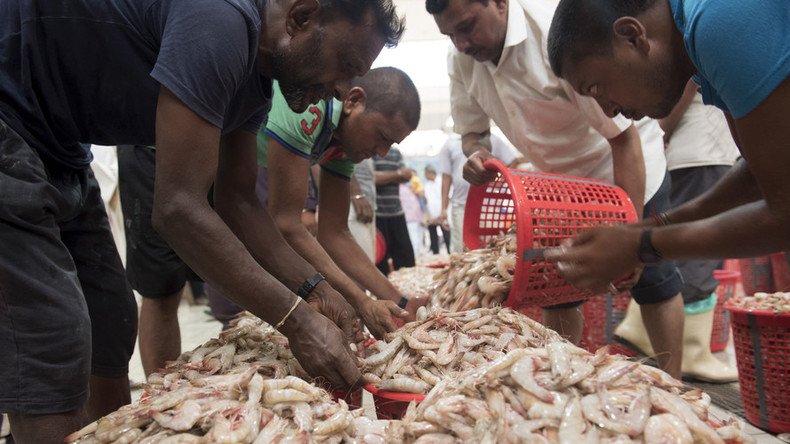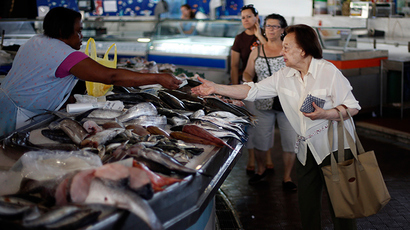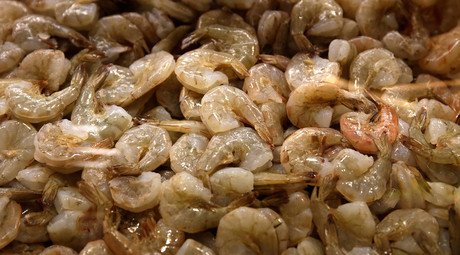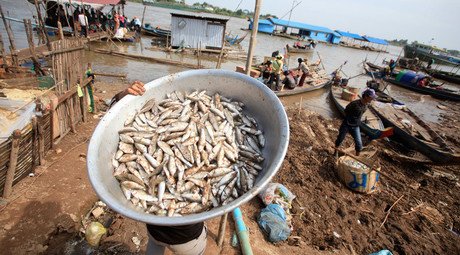Wal-Mart, Red Lobster, Whole Foods and other retailers sell slave-peeled shrimp – report

Systemic human trafficking in Thailand is the engine that helps supply cheap shrimp to the US, Europe, and Asia, the AP reports. Forced laborers, including children, work 16 hours a day under threat of violence, deportation, or imprisonment.
Lax enforcement and low awareness of forced-labor laws in Thailand allow powerless workers, most of whom are undocumented migrants at the mercy of their handlers and bosses, to fuel the country's $7 billion seafood export industry, the Associated Press reported. Shady exporters and subsidiary suppliers have been taking advantage of the situation, as parent companies that operate with a global reach claim ignorance of abuses they call abhorrent.
US custom records have linked slave-intensive shrimp production originating from the Gig Peeling Factory in Samut Sakhon, Thailand, to Thai exporters and subsidiaries associated with some of the world’s largest seafood companies, including Japan’s Maruha Nichiro Foods, as well as Thai Union, Kongphop Frozen Foods, and The Siam Union Frozen Foods.
More great investigative reporting by AP into slavery in SE Asia's fishing industries. This time shrimp in Thailand https://t.co/WCwM8uTQzV
— Adam Dean (@adamjdean) December 14, 2015This shrimp – processed by migrants including small children forced to work 16 hours for little if any pay under threat of jail, violence, or deportation – is eventually distributed by the top companies to locations across the world, winding up as part of seafood packaged under the label of 40 US brands, including Sea Best, Aqua Star, Chicken of the Sea, and pet food Fancy Feast. In the US, where 90 percent of shrimp is imported, millions of people dine on shrimp produced with forced labor every day.
Thai Union, for example, ships to dozens of US companies, custom records indicate, including chain restaurants Olive Garden, LongHorn Steakhouse, and The Capital Grille. US retailers such as Wal-Mart, Kroger, Whole Foods, Dollar General, and Petco are also linked to slave shrimp from Thailand, AP reported. The companies are profiting off slave labor, as defined by the US government.
"I am deeply disappointed that despite our best efforts we have discovered this potential instance of illegal labor practice in our supply chain," Thai Union CEO Thiraphong Chansiri told AP. He went on to acknowledge "that illicitly sourced product may have fraudulently entered its supply chain," while confirming a supplier "was doing business with an unregistered pre-processor in violation of our code of conduct."
The companies that ended up being the face of slave-produced shrimp say they were not aware of the working conditions involved in their shrimp processing chain, and that they abhor the forced-labor practices uncovered by Associated Press. Some claim to have taken steps to remedy their tainted supply chains.
"I want to eliminate this," Dirk Leuenberger, CEO of Aqua Star, told AP. "I think it's disgusting that it's even remotely part of my business."
Walmart, Costco tied to slave labor in shrimp industry http://t.co/ia5W5MlK5f
— RT America (@RT_America) June 11, 2014AP’s report focused on Samut Sakhon, a port town about an hour from Bangkok. There are about 10,000 migrant children, ages 13 to 15, working in Samut Sakhon, according to the International Labor Organization. A UN study found nearly 60 percent of Burmese laborers in the city’s seafood processing industry are trapped, forced to work under dire conditions, and faced with insurmountable debt.
There are few if any avenues of official recourse for forced workers, especially undocumented laborers, who face harsh repercussions should they cross their bosses. Police and inspectors working with major companies are rarely a source of relief for such laborers. Even documented workers are vulnerable, for instance if they do not have possession of their identification documents.
One worker who escaped a shrimp-production facility not far from the Gig Peeling Factory in Samut Sakhon told AP just how miserable daily conditions for workers: a pregnant woman who miscarried on the factory floor was forced to continue working for four days while hemorrhaging; an unconscious toddler who fell 12 feet onto a concrete floor was refused medical care; a pregnant woman who tried to escape was pulled into a car by her hair and later handcuffed to another worker.
"Sometimes when we were working, the tears would run down our cheeks because it was so tiring we couldn't bear it," said the worker, who did not offer his name.
"We were crying, but we kept peeling shrimp," he said. "We couldn't rest. ... I think people are guilty if they eat the shrimp that we peeled like slaves."
AP’s report is the latest in its series of investigations into global seafood production linked to forced labor. The news organization said that more than 2,000 trapped fisherman have been freed thanks to its reporting, in addition “to a dozen arrests, millions of dollars’ worth of seizures and proposals for new federal laws.”
Thailand is a nation with interest in joining the Trans-Pacific Partnership, a so-called free trade deal between a dozen Pacific Rim nations that many believe will weaken labor rights while exacerbating human trafficking.
















